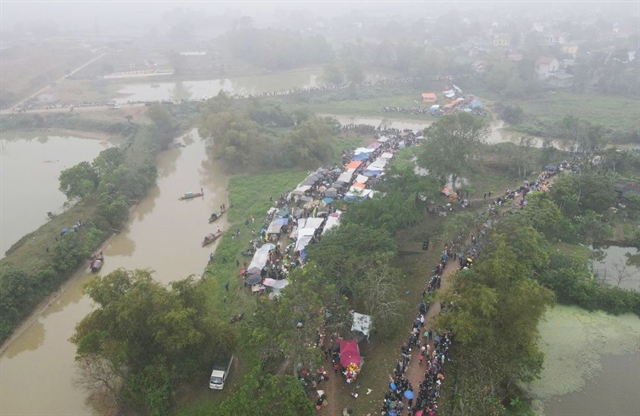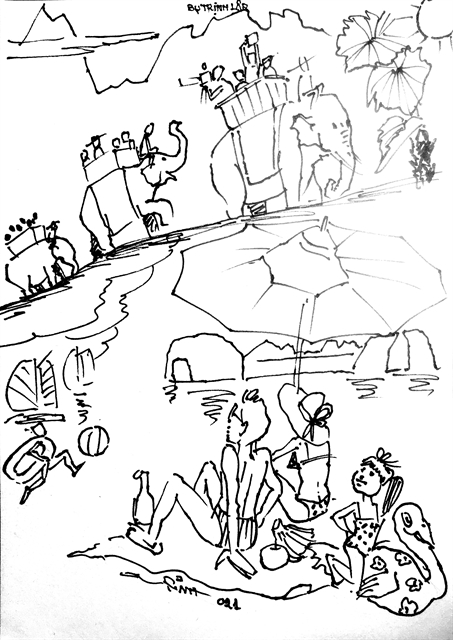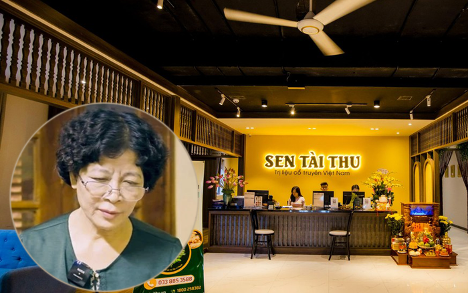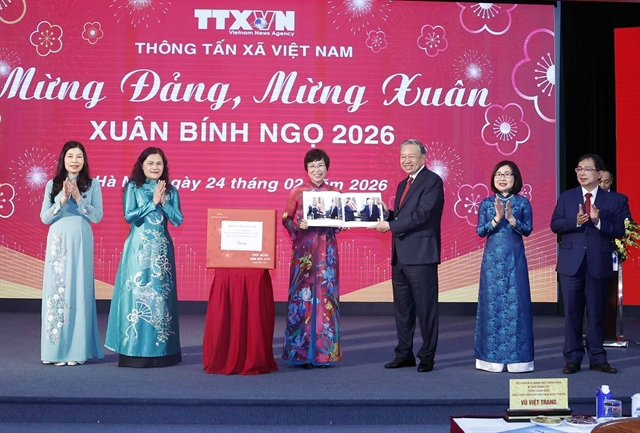 Talk Around Town
Talk Around Town

Travel in the era of coronavirus will see a surge in use of private villas and boats. Boutique hotels or secluded homestays by the beach or a lake, and quiet homes in the countryside will go up in demand.

|
| Illustration by Trịnh Lập |
By Nguyễn Mỹ Hà
Pre-pandemic travel was dominated by mass tourism and low cost airfares where you could pretty much craft your own itinerary from anywhere to anywhere without much restriction, provided you had the requisite visas.
But things have changed. Low-cost airfares? Not anymore.
Over the past two years, travel restrictions on all continents have seen air carriers and travel companies suffering mounting losses. On the ground, regional lockdowns and curfews have stopped many from travelling.
Online travel companies are now carefully researching and encouraging new travel trends, which have been starting to pick up in places less affected by the pandemic.
Staycations, no-touch travel, health tours and solo trips to deserted or hard-to-get-to places are now high on the menu.
Staycations were popular last summer. When people needed fresh air, cocktails, or to lounge in a pool, they did so much closer to home, sometimes even at home.
In the summer, Việt Nam imposed a complete lockdown across the country until the majority of the population had received two vaccinations, and then gradually lifted social distancing.
Currently, Hà Nội and Quảng Ninh and 26 other cities and provinces have had more than 95 per cent of its adult population vaccinated. Health apps can show that you are vaccinated, and you must scan QR codes before entering public offices or visiting other provinces.
Quảng Ninh, with its key position by the northeastern sea, has been carefully checking people and vessels before entering the province.
Just last month, a colleague on a work trip to Quảng Ninh was hindered at the entrance to the province because the driver's home ward was listed in Hà Nội's red zone.
The driver and company car could not get into Quảng Ninh, and the rest of the entourage had to find other ways to complete their assignment.
People say that once you get into a different province, you are free to roam around. But that’s not the case in Quảng Ninh. You're requested to scan QR codes almost everywhere, even before your sit down at a simple sidewalk phở shop, cafe or office.
The tourist island of Tuần Châu was almost deserted when we visited, but you were requested to scan at the port, when you got on the boat, and when you went up to a grotto for a walk.
Scattered family groups, or close friends, who can travel together are the most common visitors these days. Groups of six to ten people, who can sit in a seven or 12-seat car, or who can all rent a boat together, are easily accommodated.
Health concerns make people sceptical of accepting unknown guests into their groups to share a car, a boat or any ride.
A forum held by RMIT University in Hà Nội last month on “Tourism and Hospitality Managing in Uncertain Times and Way Forward”, had five-star hotel managers and tourism training institutions together discuss how to forge a way out of this uncertainty.
Dr Hà Văn Siêu, deputy chairman of Việt Nam National Administration of Tourism, told the online forum of about 100 tourism administrators that room occupancy rates in the country were about 20 per cent in 2020 and went down to under 10 per cent in 2021.
He called on business leaders in the tourism and hotel industry to adjust their policies to catch up with and detect new tourism trends.
"Domestic travel shall rise strongly. We're expected to see a sharp increase in the number of locals reaching out to beaches, mountain retreats, forests trekking and national parks, followed by cultural destinations, historical landmarks and amusement parks," he said.
"As a result, travel and hotel businesses need to renew themselves and provide a diverse service list focusing on safe and health boosting experiences, nature contemplation and other self-searching purposes."
This all reflects the nature of travel, which is to find your inner self, and take a break from your stressful or mundane routine work to give your body an energy recharge and cleanse not only the body, but the mind.
The rush to get to the world's most popular beaches, home-shares, massive hotels and mega-metropolises could all become a thing of the past.
Travel in the era of coronavirus will see a surge in use of private villas and boats. Boutique hotels or secluded homestays by the beach or a lake, and quiet homes in the countryside will go up in demand.
There will be several services that will accompany this trend: room service, self-catering, COVID test kits delivered direct to your accommodation.
Quảng Ninh with its UNESCO World Heritage Hạ Long Bay, beautiful beaches and thousands of lime-karst stones will rise in demand according to the changes. Its strong modern tourist boats and well-trained on-board staff will easily cater to the new trends.
Traveloka, a website that looks at tourist trends, suggests that people will turn to health-centred holidays. The United Nations World Tourism Organization also predicts a strong surge in health-related travel. The Global Wellness Institute has forecast that this type of travel could be worth up to US$900 billion in 2022.
However, until this becomes a reality, travellers need to look to small- or limited sized destinations according to your own budget and health capacity. Even if taking a romantic holiday for two parachuting above Hạ Long Bay, or just a long walk in a nearby park, remember to bring your phone for QR code scanning and never forget to practise the five key rules [5Ks in Vietnamese] to keep yourself safe from the coronavirus: wear your mask, regularly disinfect, no gatherings, social distancing, and making health declarations on national coronavirus apps.
Be strong and stay safe. VNS




